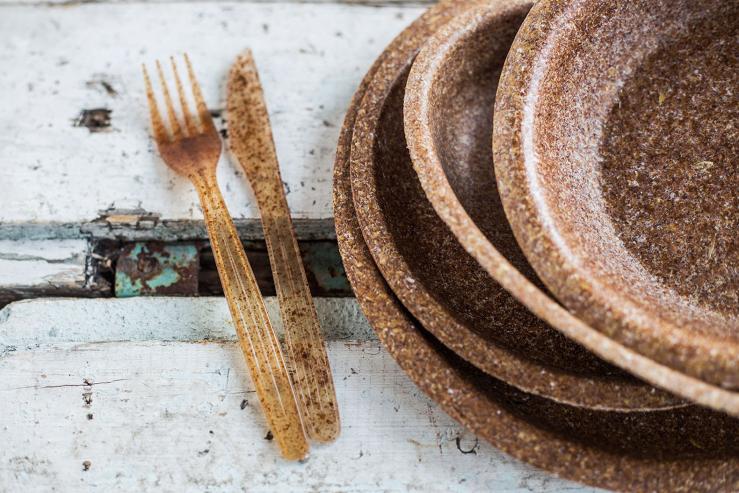With oceans becoming clogged by plastics, companies are introducing eco-friendly consumer products to take advantage of the public growing concerns over plastic waste. Most of the plastics are actually packaging. This problem has been addressed by some biodegradable solutions such as bioplastic, paper or even bamboo containers. However, they still need at least half a year to degrade. Warsaw-based manufacturer Biotrem is making more than 10 million pieces of biodegradable disposable (single-use) tableware and cutlery that compost — without need for industrial composting facilities — within 30 days.
The European Innovation Council pilot's funded technology company Biotrem’s wheat bran tableware offers an eco-friendly alternative to plastic plates and bowls. Bran is a byproduct of grain milling processes, which is typically turned into animal feed or treated as a semi-waste product. Biotrem’s production process bakes it into edible plates and bowls suitable for use in ovens and microwaves, which can be composted to fertilize new wheat. Further, Biotrem’s production process does not require significant amounts of water, or mineral resources, or chemical compounds. From 1 ton of pure, edible wheat bran they can produce up to 10,000 units of plates or bowls, fully biodegradable – through composting – in just 30 days.
The idea to use wheat bran occurred in the late 1990s to Jerzy Wysocki, whose family’s milling business dates back to the beginning of the twentieth century. Wysocki was looking for uses for wheat bran, a byproduct in the wheat grain milling process, other than animal feed or compost. The family milling business was small and couldn’t compete with large mills taking over the market in the late 1990s and early 2000s. He gave up traditional milling and bet it all on the new model.
Biotrem’s long-term business plan is spreading the technology behind its production of bio-based tableware and packaging outside Poland, which should lead to lower production costs, Biotrem marketing specialist Artur Bednarz said. European distributors — such as large wholesalers in the Czech Republic and Slovakia — are ordering “really large quantities,” according to Bednarz, mostly used by street-food joints, restaurants, event organizers and caterers.
Their products can be purchased in more than 18 countries, including South Korea. In fact, their products can be purchased at Shinsegae Mall, SSG.com and Eleven Street. According to a Shinsegae official, "More and more consumers are showing interest in sustainability and putting emphasis on diverse trends. We decided to sell Biotrem plates to respond to such changing demand."
The company has received a Phase 1 grant from the EIC pilot SME Instrument in 2016 and a Phase 2 grant in 2018 of 2.238.075 €
The Guardian, CNBC, Koreatimes and others have already distinguished Biotrem as one of the startups paving the way for a world without plastics.
View Biotrem's information on the EIC SME Instrument data hub.

DISCLAIMER: This information is provided in the interest of knowledge sharing and should not be interpreted as the official view of the European Commission, or any other organisation.

